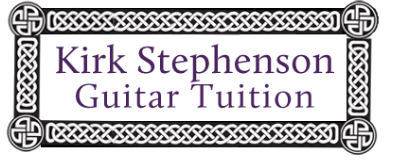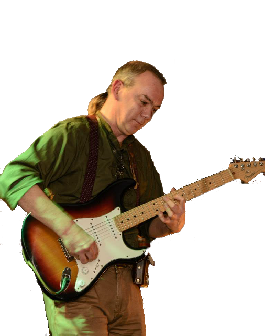Copyright © 2025 Kirk Stephenson Guitar Tuition


The Dagda's Coat
The Dagda is the Great Father-
The Dagda is the owner of a magical harp that can play the music of joy, sorrow and peace and can lull his enemies to sleep. He is also renowned as a warrior, artisan, magician and King. In the 2nd Battle of Mag Tuired he promised: "all that each of you shall do, I shall do myself, single-
In writing this piece I pictured the leaves swirling round the Dagda's feet as he strides through the autumn woodlands in his coat of many colours; stirring up mischief and righting that which is wrong.
 Listen
Print and play
Listen
Print and play
Tunes from Celtica:
The Album Celtica is a collection of Celtic fusion compositions for acoustic guitar. These finger-
Cottage Pie
I wanted to write a piece in the style of Shepherd's Delight, a traditional Irish tune arranged by Martin Simpson, which appears in the collection Celtic Fingerstyle Guitar.
The title Shepherd's Delight is thought to refer to the sunset. I called my piece Cottage Pie, since both titles also belong to Irish recipes.
The term cottage pie was in use in 1791 when the potato was being introduced as an edible crop affordable to the poor. In Irish history, the Great Hunger was a period of mass starvation, disease and emigration between 1845 and 1852. It was brought about by potato blight and the nations dependency on the potato for food. The famine was a watershed in the history of Ireland, which entered folk memory and was lamented in story and song.
John Barleycorn
This tune was written in the winter of 2011. At the midwinter solstice, our ancestors celebrated the return of the sun. In the story of the year in Celtic paganism, the Oak King Defeats the Holly King at midwinter allowing heat and light and life to return to earth. It seemed natural to write a tune about the spirit of the fields and the return of the sun at the turning of the year, where the suns power first begins to wax.
Harvest Home
I wrote this arrangement in 2006; it's based on the traditional Irish hornpipe of the same name. This piece is about bringing in the summer's harvest.
The Crystal Pool
This contemporary piece was written in 2011. It's a melancholy piece for fingerstyle performance
The Glass Castle
This was written in 2012 after a visit to Holy Island, Anglesea.
This Glass Castle is about Arianrhod of Welsh mythology, who weaves dreams from the Glass Castle at the end of time. This tune is strange, haunting & lyrical. The music describes the journey through the outer courtyard into the castles turreted interior
The Quiet Ice
This original piece is for guitar and flute. It was written in the winter of 2010 in the middle of the big freeze when the snow fell softly and the temperature dropped to twenty below zero. The outside world was shrouded in freezing-
The Silver Tree
This piece is based on the twin trees in the courtyard of Arianrhod's castle. It has a medieval, almost otherworldly feel.
Amergain's Rann
This tune is called Amergain's Rann. Amergain was the first of the druids and the leader of the Milesians, some of the earliest settlers in Ireland. According to the Book Of Invasions the Milesians came from beyond the stars and fought a magical battle against the Old Gods for the posession of Ireland.
It was on the first day of May that the Milesians came into Ireland. They came with their wives and their children and all their treasures. There were many of them, and they came in ships, and it is said by some that they came from a land beyond the utmost blueness of the sky and that their ships left the track among the stars that can still be seen on winter nights.
They finally defeated the Old Gods of Ireland who withdrew into the Hollow Hills but Nuada, their King, said to the Amergain:
We will give you Ireland: but, since our hands have fashioned it, we will not utterly leave this country. Our presence will remain in the land as you walk over it. We will be the white mist that clings to the mountains; we will be the quiet that broods on the lakes; we will be the joy-